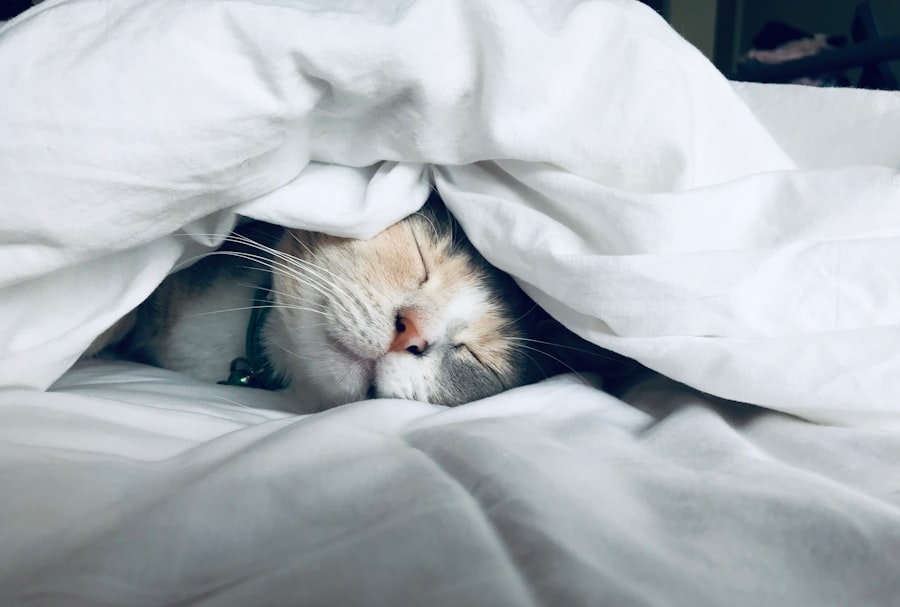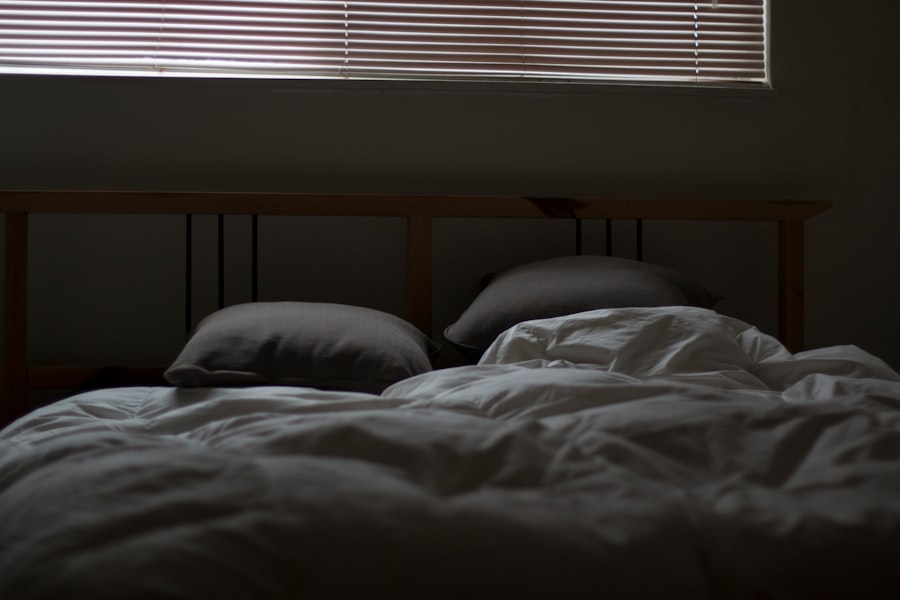
Sleep quality is a multifaceted concept that extends beyond the mere duration of sleep. It encompasses various factors, including how quickly one falls asleep, the number of awakenings throughout the night, and the overall restorative nature of the sleep experienced. High-quality sleep is characterized by deep, uninterrupted cycles that allow the body to undergo essential processes such as tissue repair, memory consolidation, and hormonal regulation.
Conversely, poor sleep quality can lead to a myriad of health issues, including cognitive decline, weakened immune function, and increased susceptibility to chronic conditions such as obesity and diabetes. Understanding the nuances of sleep quality is crucial for anyone seeking to improve their overall well-being, as it serves as a foundation for physical health, emotional stability, and cognitive performance. Moreover, sleep quality is influenced by a variety of external and internal factors.
Lifestyle choices, such as diet, exercise, and screen time before bed, can significantly impact how well one sleeps. For instance, consuming caffeine or heavy meals close to bedtime can disrupt the natural sleep cycle, leading to restless nights. Additionally, psychological factors such as stress and anxiety can create a vicious cycle where poor sleep exacerbates mental health issues, further diminishing sleep quality.
Recognizing these interconnected elements is essential for developing effective strategies to enhance sleep quality. By taking a holistic approach that considers both physiological and psychological aspects, individuals can work towards achieving a more restful and rejuvenating sleep experience.
Key Takeaways
- Understanding Sleep Quality
- Quality sleep is essential for overall health and well-being.
- Creating a Sleep-Optimized Environment
- Keep the bedroom dark, quiet, and cool to promote better sleep.
- Developing a Consistent Sleep Schedule
- Stick to a regular sleep schedule, even on weekends, to regulate your body’s internal clock.
- Prioritizing Sleep Hygiene
- Limit screen time before bed and avoid caffeine and heavy meals close to bedtime.
- Incorporating Relaxation Techniques
- Practice relaxation techniques such as deep breathing or meditation to prepare the body for sleep.
- Managing Stress and Anxiety
- Find healthy ways to manage stress and anxiety, such as exercise or talking to a therapist.
- Seeking Professional Help if Necessary
- If sleep troubles persist, seek help from a healthcare professional to address any underlying issues.
Creating a Sleep-Optimized Environment
Darkness and Light Control
Darkness is particularly important as it signals the body to produce melatonin, the hormone responsible for regulating sleep-wake cycles. To create an ideal sleeping environment, individuals should consider using blackout curtains or eye masks to block out any intrusive light sources.
Minimizing Noise and Distractions
Additionally, minimizing noise through earplugs or white noise machines can help create a serene atmosphere conducive to restful sleep. The importance of these elements cannot be overstated; even minor disturbances can lead to fragmented sleep and reduced overall restfulness.
Temperature Regulation and Comfort
Temperature regulation is another critical aspect of a sleep-friendly environment. Research suggests that the optimal sleeping temperature for most individuals hovers around 60 to 67 degrees Fahrenheit (15 to 19 degrees Celsius). A room that is too hot or too cold can lead to discomfort and frequent awakenings throughout the night. Furthermore, investing in a quality mattress and pillows tailored to one’s sleeping position can significantly enhance comfort levels. The right bedding materials can also contribute to temperature regulation, ensuring that individuals remain cozy without overheating. By thoughtfully curating their sleeping environment, individuals can create a sanctuary that promotes deep, restorative sleep and ultimately enhances their overall health and well-being.
Developing a Consistent Sleep Schedule

Establishing a consistent sleep schedule is one of the most effective strategies for improving sleep quality. The human body operates on a circadian rhythm—a natural internal clock that regulates various biological processes over a 24-hour cycle. By going to bed and waking up at the same time each day, individuals can reinforce their circadian rhythms, making it easier to fall asleep and wake up feeling refreshed.
This consistency helps signal to the body when it is time to wind down and prepare for rest, leading to more efficient sleep cycles. Over time, adhering to a regular schedule can significantly enhance both the quantity and quality of sleep. However, developing a consistent sleep schedule requires commitment and discipline.
It may be tempting to indulge in late-night activities or sleep in on weekends; however, such irregularities can disrupt the body’s natural rhythm and lead to what is commonly referred to as “social jet lag.” This phenomenon can result in feelings of grogginess and fatigue during waking hours, counteracting any potential benefits gained from extra sleep. To combat this issue, individuals should aim to prioritize their sleep schedule as they would any other important commitment in their lives. By setting boundaries around bedtime and wake time—such as limiting screen time before bed or creating a calming pre-sleep routine—individuals can cultivate habits that promote better sleep hygiene and overall health.
Prioritizing Sleep Hygiene
| Metrics | Results |
|---|---|
| Bedtime consistency | 80% |
| Average hours of sleep per night | 7.5 hours |
| Screen time before bed | Less than 30 minutes |
| Caffeine intake after 4pm | None |
Sleep hygiene refers to a set of practices and habits that are conducive to sleeping well on a regular basis. Prioritizing sleep hygiene involves creating routines that signal to the body that it is time to wind down and prepare for rest. This may include establishing a calming pre-sleep ritual that incorporates activities such as reading, gentle stretching, or meditation.
Engaging in these relaxing activities can help transition the mind from the busyness of the day into a state of tranquility conducive to sleep. Additionally, it is essential to limit exposure to screens in the hour leading up to bedtime; the blue light emitted by devices can interfere with melatonin production and disrupt the natural sleep cycle. Another critical aspect of sleep hygiene is being mindful of what one consumes in the hours leading up to bedtime.
Caffeine and nicotine are stimulants that can significantly hinder the ability to fall asleep or stay asleep throughout the night. Similarly, heavy meals or alcohol consumption close to bedtime can lead to discomfort or disrupted sleep patterns. Instead, individuals should consider opting for light snacks if they feel hungry before bed—foods rich in tryptophan or magnesium may promote relaxation and aid in falling asleep more easily.
By adopting these practices and being intentional about their choices surrounding sleep, individuals can foster an environment that supports restorative rest and enhances overall well-being.
Incorporating Relaxation Techniques
Incorporating relaxation techniques into one’s nightly routine can be an effective way to enhance sleep quality. Techniques such as deep breathing exercises, progressive muscle relaxation, or guided imagery can help calm an overactive mind and prepare the body for rest. Deep breathing exercises involve focusing on slow, deliberate breaths that engage the diaphragm rather than shallow chest breathing.
This practice not only helps reduce stress but also lowers heart rate and blood pressure—physiological changes that are conducive to falling asleep more easily. Progressive muscle relaxation involves systematically tensing and relaxing different muscle groups throughout the body, promoting physical relaxation and reducing tension that may hinder restful sleep. Mindfulness meditation is another powerful tool for enhancing relaxation before bed.
By focusing on the present moment without judgment, individuals can cultivate a sense of calm that counteracts racing thoughts or worries about the day ahead. Guided imagery techniques involve visualizing peaceful scenes or experiences that evoke feelings of tranquility; this mental escape can be particularly effective for those who struggle with anxiety or intrusive thoughts at night. Incorporating these relaxation techniques into one’s pre-sleep routine not only aids in falling asleep but also contributes to deeper stages of restorative sleep throughout the night.
Managing Stress and Anxiety

Understanding the Impact of Stress and Anxiety on Sleep
Stress and anxiety are two significant barriers that can impede quality sleep. The demands of modern life often lead individuals to experience heightened levels of stress, which can manifest in racing thoughts or physical tension that makes it difficult to unwind at night. To effectively manage stress and anxiety, it is essential to identify triggers and develop coping strategies tailored to individual needs.
Effective Coping Strategies for Stress and Anxiety
This may involve engaging in regular physical activity—exercise has been shown to reduce stress hormones while promoting endorphin release, which can enhance mood and facilitate better sleep. Additionally, journaling can serve as an effective outlet for processing thoughts and emotions before bedtime. By writing down worries or tasks for the next day, individuals can clear their minds of clutter that might otherwise keep them awake at night.
Cognitive-Behavioral Techniques for Better Sleep
Cognitive-behavioral techniques may also be beneficial; reframing negative thought patterns or practicing positive affirmations can help shift focus away from anxiety-inducing thoughts toward more constructive perspectives. By actively managing stress and anxiety through these methods, individuals can create a more conducive mental environment for restful sleep.
Seeking Professional Help if Necessary
While many strategies exist for improving sleep quality independently, there are instances where professional help may be necessary. Individuals who consistently struggle with insomnia or other sleep disorders may benefit from consulting with a healthcare provider or sleep specialist who can offer tailored guidance based on their specific needs. Sleep disorders such as obstructive sleep apnea or restless leg syndrome require medical intervention for effective management; untreated conditions can lead to serious health complications over time.
Moreover, mental health professionals can provide valuable support for those whose sleep issues are rooted in anxiety or depression. Therapy options such as cognitive-behavioral therapy for insomnia (CBT-I) have been shown to be effective in addressing both psychological factors contributing to poor sleep as well as developing practical strategies for improvement. Seeking professional help should not be viewed as a last resort but rather as an empowering step toward reclaiming one’s health and well-being through better sleep practices.
By recognizing when additional support is needed, individuals can take proactive measures toward achieving restorative rest and enhancing their overall quality of life.
FAQs
What is sleep optimization?
Sleep optimization refers to the practice of improving the quality and quantity of sleep in order to promote overall health and well-being. It involves adopting healthy sleep habits and making lifestyle changes to ensure a restful and rejuvenating sleep experience.
Why is sleep optimization important?
Sleep optimization is important because quality sleep is essential for physical, mental, and emotional health. It plays a crucial role in cognitive function, immune function, mood regulation, and overall well-being. Poor sleep can lead to a range of health issues, including increased risk of chronic diseases and impaired daily functioning.
What are some tips for sleep optimization?
Some tips for sleep optimization include maintaining a consistent sleep schedule, creating a relaxing bedtime routine, optimizing your sleep environment, avoiding stimulants and electronic devices before bed, and managing stress and anxiety. It’s also important to prioritize regular physical activity and a healthy diet to support quality sleep.
How can technology help with sleep optimization?
Technology can help with sleep optimization by providing tools and resources to track and analyze sleep patterns, monitor sleep quality, and offer personalized recommendations for improving sleep habits. This can include wearable devices, sleep tracking apps, and smart home technology designed to create a sleep-friendly environment.
What are the benefits of sleep optimization?
The benefits of sleep optimization include improved cognitive function, better mood and emotional regulation, enhanced immune function, reduced risk of chronic diseases, and overall improved quality of life. Quality sleep also supports physical performance, recovery, and overall productivity.






